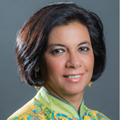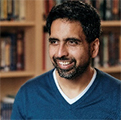New Economy Forum: Learning in the Time of COVID

IMF SEMINAR EVENT
DATE: October 12, 2020
DAY: Monday
1:00 PM - 1:30 PM
LOCATION: Virtual
Overview
The pandemic is exposing and exacerbating inequalities, putting tremendous pressure on students, parents, and teachers, and leaving millions of kids at risk of dropping out of school. These pressures could leave lasting scars on an entire generation of learners. Sal Khan, Founder and CEO of the Khan Academy, and Sabina Bhatia, Deputy Secretary of the IMF, will discuss the challenges to our students and our education systems, the value and limitations of virtual learning, and the long-term impact on our societies.
Join the conversation via #NewEcon #IMFmeetings
New Economy Forum: Learning in the Time of COVID
SUMMARY
The pandemic is putting tremendous pressure on students, parents, and teachers when it comes to learning and education, leaving millions of kids at risk of dropping out of school. It could also have a long-term impact on the education system. Bhatia and Khan discussed the value and limitations of remote learning, and the future of education system after the pandemic.
Key Points:
- Remote learning during the pandemic: Bhatia noted that the in-person learning experience is usually much better than remote learning and asked for suggestions on how to make remote learning a better experience for both students and teachers. Khan noted that remote learning during the pandemic is particularly challenging since the most important part of education–social interaction–is missing. As a result, teachers are encouraged to make remote learning as interactive as possible by creating virtual breakout sessions with small groups of students to facilitate better interaction and engagement.
- Long-term impact of remote learning: Bhatia acknowledged the significant challenges faced by the poor who may be left out of the online education system with a long-term detrimental impact on both teachers and students. Khan agreed that digital divide poses several challenges and stressed that technology cannot replace humans, and good teachers are always essential. However, technology can complement and enhance the teaching methods and can be used to provide wider access to world-class learning materials and tutors.
- Competency-based learning: Khan noted that for policy makers, it is important to create a competency-based credential infrastructure for the education system, so students can be recognized by their skills and capability for higher education or employment.
- Education after the pandemic: As policy makers are discussing the K-shaped economic recovery after the pandemic, Khan noted that the pandemic will have a similar K-shaped impact on education. However, when education is less bounded by time and space, and a new generation of parents and students can take more responsibility of learning, the education system may become more effective. To overcome digital divide, internet access and infrastructure is important and social return on such an investment is high and should be promoted by policy makers.
Quotes:
- The idea that the leaning should not be bounded by time and space becomes a necessity during the COVID… a lot of these trends are useful even after the COVID.” – Sal Khan
- “People are talking about the K-shaped recovery when it comes to the economy… and COVID will do something very similar on the education side.” – Sal Khan
Panelists
Moderator: Sabina Bhatia

Sabina Bhatia is Deputy Secretary of the IMF. Prior to that, she was Assistant Director in the Communications Department. Sabina has a B.A. from Calcutta University and an M.A. in Applied Economics from Johns Hopkins University.
Panelist: Sal Khan
 Sal Khan is the founder and CEO of Khan Academy, a nonprofit educational organization that offers free lessons in math, sciences and humanities in multiple languages, as well as free tools for parents and teachers to track student progress.
Sal Khan is the founder and CEO of Khan Academy, a nonprofit educational organization that offers free lessons in math, sciences and humanities in multiple languages, as well as free tools for parents and teachers to track student progress.







